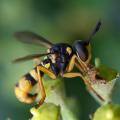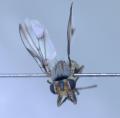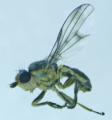Diptera.info :: Identification queries :: Diptera (adults)
Who is here? 1 guest(s)
|
Empididae, genus?
|
|
| proctoss |
Posted on 24-08-2006 19:57
|
|
Member Location: Moscow, Russia Posts: 191 Joined: 13.08.06 |
Baltic sea, ID?
proctoss attached the following image:  [123.59Kb] |
| proctoss |
Posted on 24-08-2006 19:59
|
|
Member Location: Moscow, Russia Posts: 191 Joined: 13.08.06 |
next
proctoss attached the following image:  [119.19Kb] |
| proctoss |
Posted on 24-08-2006 19:59
|
|
Member Location: Moscow, Russia Posts: 191 Joined: 13.08.06 |
next
proctoss attached the following image:  [73.36Kb] Edited by proctoss on 24-08-2006 19:59 |
| Kahis |
Posted on 24-08-2006 20:27
|
|
Member Location: Helsinki, Finland Posts: 1999 Joined: 02.09.04 |
Leptopeza flavipes (Hybotidae). The well-developed ovipositor is typical for females of this genus. Hybotidae was formerly considered a part of Empididae, but it is now seen as a distinct family. Once again you photos are of amazing quality. Care to tell what equipment you use? And how are the flies dried? I guess they are originally collected in alcohol - or another liquid - and then perhaps immersed in a hardening agent before drying. Or do you use freeze-drying? Kahis |
| proctoss |
Posted on 24-08-2006 23:21
|
|
Member Location: Moscow, Russia Posts: 191 Joined: 13.08.06 |
Kahis wrote: Leptopeza flavipes (Hybotidae). The well-developed ovipositor is typical for females of this genus. Hybotidae was formerly considered a part of Empididae, but it is now seen as a distinct family. Once again you photos are of amazing quality. Care to tell what equipment you use? And how are the flies dried? I guess they are originally collected in alcohol - or another liquid - and then perhaps immersed in a hardening agent before drying. Or do you use freeze-drying? Hi Kahis, Thanks for help! You are right, these flies were collected in alcohol and dried according to method of B. Brown ?AN ALTERNATIVE TO CRITICAL POINT DRYING? http://www.phorid.net/phoridae/dry.htm Regarding Leptopeza flavipes, in my old key in this species for females yellow shining mesonotum is given. And my specimen has black and shining mesonotum like this Leptopeza borealis Ztt. So what? Edited by proctoss on 25-08-2006 06:01 |
| Jump to Forum: |
















